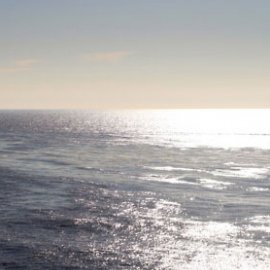Ocean Light
I lived for twenty years in a mega-city, with all its joys and frustrations. It is a place where life moves at a hectic pace, innovation thrives, and people make, and lose, their fortunes. It is an ocean city, but you would hardly know it in that its port is mostly distant, and slowly its waterfront has transformed from a vital working place, to a derelict place, to a recreational place where people come to run and walk and socialize.

That waterfront is a place where residents come for light. I can remember walking in the deep canyons of the city's architectural heights and seeing a shaft of light illuminating the side of a glass façade, breaking through to surprise me, encourage me, that there is that freedom from darkness, from the weight of work or any other oppressing thing that might be on my mind as a city dweller. I was fortunate to work by the river and so perceived that ocean light more often than most, with liberating effect.
Ocean light.
It is different in so many ways. Obviously it is light reflected, relentless glare, or refracted fragments, or dull sheen - a mirror of the various filters of passing weather and the sun moving across the sky. Ocean light changes with the wind and tide and motion generated by forces oftentimes originated far away. An earthquake or a ship's wake can generate a shift in light many miles distant. A passing front, a raft of cloud, even the turning of a flock of birds can cause the light to change before our very eyes. The variety of light is an essential element of sea experience.
It seems to me that consciousness of light is not always top of mind. How many of us live in a lightless world? Artists and photographers, for example, live by light, attempting to recreate or capture its presence in a single frame. We learn to appreciate how light falls through a window onto a woman's face. Or to admire how light on walls or natural features can transform a realistic cause into an abstract effect. We objectify light, subjectify light, calculate by the speed of light, and celebrate light in our religious beliefs as a force transcendent.
When we want to see something for what it is, we shine the light upon it. When we have a brilliant idea or realization, we have seen the light. When we want to shout for joy, we trip to light fantastic. When we perceive love, we see that light in our lover's eyes. When we are aligned in time and space, we know "lightness of being." And when we ask for benediction, we invite "everlasting light to shine on me."
When I moved from the city to the north, my greatest concern was darkness. I live on a hill with a view of the ocean with the express purpose of accumulating every last lumen of light from the open summer days or the closing days of winter. I sympathize with folks who claim to suffer from some kind of light disorder, knowing full well my own need and concern that at some point there might not be enough to see me through. On those days, I will head to the shore to find the light that seems so abundant near to and on the sea.
How to explain this? We have experienced the cycle of light and dark on a daily basis over all time, and we have expressed this through self-realization in psychology, idea in philosophy, metaphor in literature, symbol in art, archetype in myth, parable in religion, progenitor/synthesizer in science, and regenerative healing treatment in health.
Light in the forest is illusive and mysterious. Light in the desert is harsh and destructive. Light on the mountain is amplified bright. Light on the ocean is dynamic and pure. When you feel dim or dark or down, find an ocean by which to re-create your self in the fulsomeness and beneficence of redemptive light.
- Login to post comments
-


